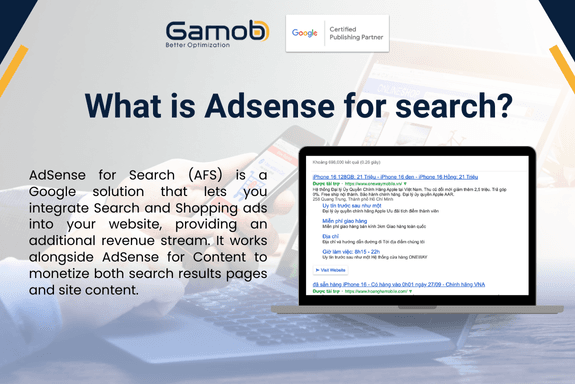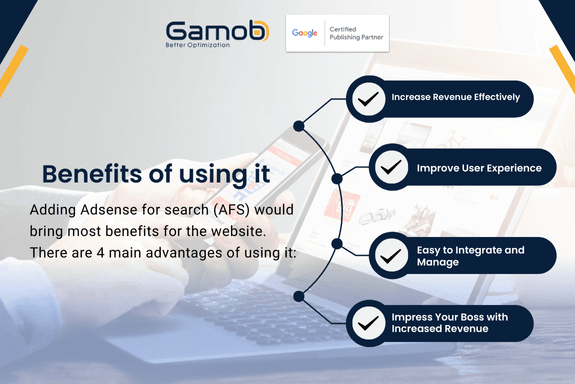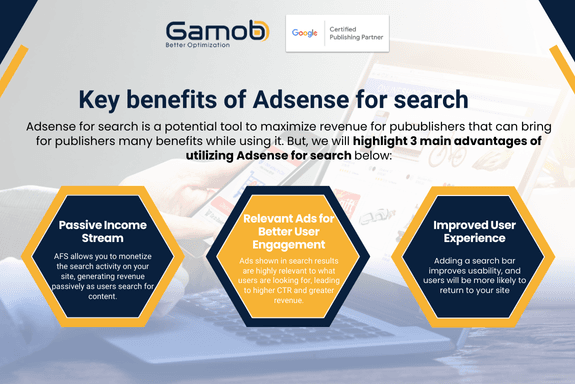Adsense For Search
When should you use Adsense for search for your website?
Tracy Nguyen
February 24, 2025

Subscribe to receive the latest blog posts to your inbox every week.
By subscribing you agree to with our Privacy Policy.
Monetizing a website is a goal many website owners, bloggers, and digital marketers strive to achieve. While there are multiple monetization methods available, one often overlooked yet highly effective tool is Google Adsense for Search (AFS). If your website already features a search bar and experiences significant internal search traffic, AFS could provide a simple yet powerful way to generate additional revenue. In this post, we’ll discuss when it's the right time to implement Adsense for Search (AFS) on your website and how it can enhance your monetization strategy.
Something about Adsense for search (AFS)
Google Adsense for Search (AFS) is a tool that allows website owners to earn revenue by displaying ads alongside search results when users search for content within their site. Unlike traditional Google Adsense, which places display ads across pages, AFS is tailored specifically for search behavior, making it highly effective for websites with search functions. When used correctly, AFS can significantly boost website revenue by targeting users based on their search activity.
The goal of this post is to help website owners determine when it’s the right time to use AFS. By understanding the key indicators and conditions that contribute to its effectiveness, website owners can maximize their earnings and improve their site's user experience.

Why It’s Important to Understand When to Use AFS:
Many website owners may not fully realize how AFS complements other monetization methods, such as display ads and affiliate marketing. While AFS can certainly generate substantial passive income, it works best when applied under the right conditions. Understanding these conditions is key to unlocking the full potential of this tool.
What is Adsense for Search?
Adsense for Search is a Google tool that adds a custom search box to your website. It monetizes the search behavior of visitors by showing Google ads alongside your site's search results. When users search for content, AFS displays targeted ads that align with the search terms, and website owners earn revenue when users click on these ads.
Difference Between Traditional Adsense and AFS:
The main difference between traditional Adsense and AFS lies in the way ads are displayed. Traditional Adsense places display ads across various pages of your website, including blogs, articles, and product pages. In contrast, AFS targets users specifically based on the search queries they enter within your site. As a result, the ads displayed are much more relevant to what users are actively looking for, leading to higher click-through rates (CTR) and more precise monetization.
How It Works:
AFS works by allowing users to enter search terms into a search box on your site. After they submit their query, the site displays relevant content alongside Google ads. These ads are chosen based on the search term, so they align with the user's intent. Earnings are generated when users click on these ads, just like with traditional display ads.
III. Key Indicators for Using Adsense for Search on Your Website
There are 5 main indicators for applying Adsense for search for your website:
1. You Have a Search Function on Your Website
The first requirement for implementing AFS is having a functional search feature on your site. If your website already includes a search bar, AFS can easily be integrated to generate additional revenue. However, if your website does not yet have a search tool, you need to implement one before AFS can be effective.
Why It’s Essential:
AFS monetizes internal search traffic. Without a search tool, there’s no way to utilize this specific revenue stream, as AFS relies entirely on the search behavior of users. Therefore, having a search bar is not just an option but a necessity for this monetization strategy to work.
2. Your Website Has a Steady Volume of Internal Search Queries
One of the most important indicators for using AFS is a consistent flow of internal search traffic. If users frequently search for content on your site, this is a strong sign that AFS can be a valuable addition to your revenue strategy.
Why It’s Important:
AFS monetizes search traffic, so the more users are engaging with your site’s search function, the greater the potential for monetization through targeted ads. A steady volume of internal searches means more opportunities for ad impressions and clicks, which directly translates into higher revenue.
3. You Have Content That Is Frequently Searched
For AFS to be effective, your site needs to have content that users frequently search for. Websites with blogs, product catalogs, FAQs, or resource pages are ideal candidates for AFS because these types of content generate frequent search queries.
How AFS Can Help:
When users search for specific terms or products, AFS can display ads that are directly relevant to their search queries. This increases the likelihood of users clicking on ads, leading to a higher CTR and more revenue for you. Websites with relevant, high-quality content will see the best results from AFS.
4. Your Website Has a Large Volume of Pages or Products
Websites with a large number of pages or product listings stand to benefit the most from AFS. Whether you run an e-commerce store or a content-heavy site, more pages mean more opportunities for users to engage with the search function—and therefore, more chances for ads to be shown.
Why Scale Matters:
Websites with many pages offer a variety of search queries that can trigger relevant ads. For instance, an e-commerce store with hundreds or thousands of products can display ads related to the user’s search terms, increasing the likelihood of monetizing traffic through AFS.
Example:
An e-commerce site that sells electronics might benefit greatly from AFS. Users searching for “laptops” or “smartphones” would see ads for related products, making it much easier for the website to generate revenue as users engage with the search function.
5. You Want to Improve User Experience
One of the key benefits of AFS is that it can enhance navigation and improve the user experience. By integrating a search feature, you’re providing visitors with an easy way to find relevant content on your site. This improves their overall experience, leading to greater user satisfaction and retention.
Ad Revenue Without Compromising UX:
The beauty of AFS is that it allows you to monetize search traffic without overwhelming visitors with intrusive ads. The ads are displayed in a non-intrusive way, allowing users to find what they’re looking for while also generating revenue for the website owner.
IV. When NOT to Use Adsense for Search
So, how we recognize our website cannot use Adsense for Search:
1. You Don’t Have a Search Functionality on Your Website
If your website doesn’t have a search bar or any search functionality, AFS won’t work for you. You need to first implement a functional search feature before considering the use of AFS. Without a search tool, there will be no search queries, and consequently, no ads to display.
2. Your Website Has Low Search Traffic
If users aren’t actively engaging with your website’s search function, then AFS may not provide significant results. Low search traffic means fewer opportunities for ad impressions and clicks, limiting the potential for monetization.
3. Your Website Has Very Little Content or Products
Websites with limited content or few products won’t generate frequent search queries, which means AFS will be less effective. If users don’t have a lot to search for, there’s a lower chance that relevant ads will be displayed.
4. Your Website Primarily Relies on Display Ads or Affiliate Marketing
If your website generates substantial revenue through other methods, such as display ads or affiliate marketing, you may not need AFS unless you specifically want to capitalize on search traffic. For example, if display ads are already providing a significant portion of your revenue, integrating AFS might only have a marginal impact.
V. How to Implement Adsense for Search on Your Website
Setting Adsense for search is not hard, we have summarized 4 steps for publishers to clearly understand the process:
Step-by-Step Process:
- Ensure You Have a Google Adsense Account: Before using AFS, you need to have a Google Adsense account. Make sure your site meets the eligibility criteria set by Google.
- Add a Search Box to Your Website: If you don’t already have a search box, add one. Ensure it’s visible and easy for users to find.
- Link the Search Box to Google Adsense for Search: Once the search box is added, link it to Google Adsense for Search, which will enable Google to display relevant ads when users search for content.
- Customize the Search Results Page: Make sure that ads are placed in a non-intrusive and visually appealing way. Customize the design to ensure that the ads blend well with your website’s layout.

Best Practices for Optimization:
- Position the search box in a visible but non-obtrusive location.
- Optimize search results so they align well with user intent, improving the likelihood of clicks.
- Regularly monitor performance through Google Analytics and Adsense reports to fine-tune your approach.
VI. Key Benefits of Using Adsense for Search
Adsense for search can bring for publishers many benefits while using it. But, we will highlight 3 main advantages of utilizing Adsense for search below:
Instead of handling AFS implementation yourself, partner with experts like Gamob, a Google Certified Publishing Partner. With over five years of experience, we help publishers maximize revenue by seamlessly integrating Google’s advertising solutions.
---------------------
Gamob | GCPP - Empower your monetization journey
- Email: [email protected]
- Website: www.gamob.com
- Linkedin: www.linkedin.com/company/gamob-gcpp